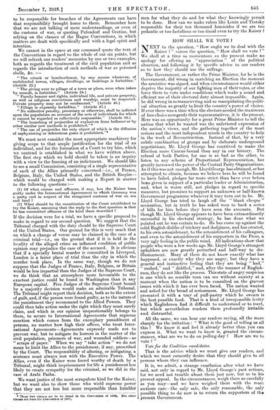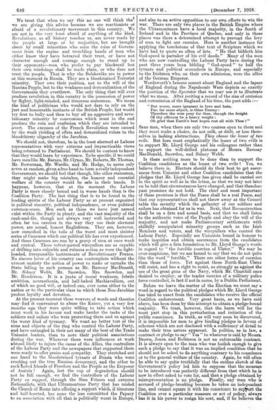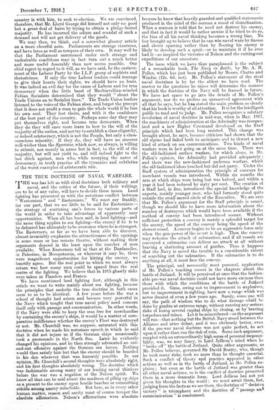HOW SHALL WE VOTE ? N EXT to the question, "How
ought we to deal with the Kaiser ? " conies the question, " How shall we vote ? " We shall at a time so momentous as the present make no apology for offering an "appreciation " of the political situation, and following it by specific advice to our readers as to how they should use the suffrage.
The Government, or rather the Prime Minister, for he is the Government, did wrong in snatching an Election the moment the armistice was signed, and when circumstances would either deprive the majority of our fighting men of their votes, or else force them to vote under conditions which make a sound and efficient use of their electoral duty almost impossible.. Again, he did wrong in Bo manoeuvring and so manipulating the politi- cal situation as greatly to limit the country's power of choice. If ever there was a time when the electors needed the maximum of free choice as regards their representatives, it is the present. Here was an opportunity for a great Prime Minister to tell the nation that what he wanted was the unfettered expression of the nation's views, and the gathering together of the most serious and the most independent minds in the country to help in the work of Reconstruction. Instead of that, by a very subtle combination of groups and by elaborate underground negotiations, Mr. Lloyd George has contrived to make the Election more Caucus-bound than any in our history. The refusal of both Parties, for one is as bad as the other, to listen to any scheme of Proportional Representation, has greatly increased the power of the Central Party Organizations.
As if this was not enough, Mr. Lloyd George has obtained, or has attempted to obtain, because we believe here he will be found to have failed, pledges far more strict than have ever before been given in support of a particular leader or Administration, and, what is worse still, not pledges in regard to specific measures, but promises to support an unknown or half-known Government programme whatever it may turn out to be. Mr. Lloyd George has tried to laugh off the " blank cheque " accusation, but in truth he has asked men to back a series of bills for him before they have seen the amounts. But though Mr. Lloyd George appears to have been extraordinarily successful in his electoral strategy, he has done what we pointed out he was certain to do. He has come up against the solid English dislike of trickery and dodginess, and has created, to his own astonishment, to the astonishment of his colleagues, and even to the astonishment of his supporters in the Press, a very ugly feeling in the public mind. All indications show that people who were a few weeks ago Mr. Lloyd George's strongest upholders are now greatly perturbed and half-way to dis- illusionment. Many of them do not know exactly what has happened, or exactly why they are angry, but they have a general and instinctive feeling that they are being " had," rushed," and " diddled," and, after the manner of English- men, they do not like the process. This state of angry suspicion is one which no sensible man can see without anxiety at a moment when the nation is to be consulted on the gravest issues with which it has ever been faced. The nation wanted and asked for the bread of seriousness. Mr. Lloyd George has presented it with a tray of puff-pastry which he swears is the best possible food. That is a kind of irresponsible levity which Englishmen find it difficult to understand or to meet, but which nevertheless renders them profoundly irritable and distrustful.
All the same, we can hear our readers saying, all the more sharply for the irritation : " What is the good of telling us all this ? We know it and feel it already better than you can express it. What we want to know is, granted the circum- stances, what are we to do on polling-day ? How are we to vote ? "
Vote for the Coalition candidates.
That is the advice which we must give our readers, and which we most earnestly desire that they should give to all persons whom they can influence.
It is, we admit, a strange conclusion after what we have said, not only in regard to Mr. Lloyd George's past actions, for we need not trouble about them just now, but as to his present appeal. In the circumstances, weigh them as carefully as you may—and we have weighed them with the most anxious care—the only safe, the only reasonable, the only possible thing to do now is to return the supporters of the present Government. We trust that when we say this no one will think that we are giving this advice because we are reactionists or afraid of a revolutionary movement in this country. We are not in the very least afraid of anything of the kind. Revolutions, as all history teaches us, are never made by the people at large or by majorities, but are brought about by small minorities who seize the reins of Govern- ment from the supine and trembling hands of men who either know they have betrayed their trust, or have not character enough and courage enough to stand up to their opponents—men who prefer to pay blackmail lest their own misdoings shall be made plain, or who dare not trust the people. That is why the Bolsheviks are in power at this moment in Russia. They are a bloodstained Terrorist minority. They owe their position, not to the will of the Russian People, but to the weakness and demoralization of the Governments they overthrew. The only thing that will ever produce revolution in this country is the possession of power by flighty, light-minded, and timorous statesmen. We mean the kind of politicians who would not dare to rely on the just and honourable instincts of the British People, but would try first to bully and then to buy off an aggressive and revo- lutionary minority by concessions which must in the end produce the ruin and confusion which they are intended to avert. The excesses of the French Revolution were caused by the weak yielding of effete and demoralized rulers to the bloodthirsty oligarchy of the Jacobins.
We should not therefore, be in the least alarmed at Labour representatives with very extreme and impracticable views being returned to Parliament. We should be content to know thatthey would learn by experience. To be specific, if we could have men like Mr. Barnes, Mr. Clynes, Mr. Roberts, Mr. Thomas, Mr. Bowerman, Mr. Wardle, and Mr. Hodge, to name only seven at random; given a free hand to form areally independent Government, we should feel that though, like other statesmen, they might make big mistakes, the honour and essential welfare of the country would be safe in their hands. It happens, however, that at the moment the Labour Party is more closely bound and in worse hands than is the Coalition Party. The last thing that is to be found in the leading spirits of the Labour Party as at present organized is political sincerity, political independence, or even political common-sense. Men such. as those we have just named exist within the Party in plenty, and the vast majority of the rank-and-file, though not always very well instructed and often far too careless in the way they use their electoral power, are sound, honest Englishmen. They are, however, now enmeshed in the toils of the worst and most sinister series of Caucuses which our political life has ever experienced. And these Cauouses are run by a group of men at once weak and cynical. These velvet-pawed wirepullers are as capable of drifting into culpable and ruinous action as were the light- headed, irresponsible instruments of Revolutionary France. No sincere lover of his country can contemplate without the utmost anxiety the notion of power to make or unmake the State falling to such persons as Mr. Ramsay MacDonald, Mr. Sidney Webb, Mr. Snowden, Mrs. Snowden, and Mr. Henderson. It is a junta of moral weakness, febrile ambition, neurasthenia, and half-baked Machiavellism, out of which no good will, or indeed can, ever come either to the nation or to the particular class to which these Neo-Jacobins profess loyalty and devotion.
At the present moment these weavers of words and theories may find it convenient to abuse the Kaiser, yet a very few months ago they were quite willing to take action which must work in his favour and make harder the tasks of the soldiers and sailors who were protecting them and us against the worst kind of tyranny. We want no better test of the aims and objects of the ring who control the Labour Party, and have entangled in their net many of the best of the Trade Unionist leaders, than to note their political associations during the war. Wherever there were influences at work abroad likely to injure the cause of the Allies, the controllers of the Labour Party and the newspapers that supported them were ready to offer praise and sympathy. They stretched out one hand to the bloodstained tyrants of Russia who were crushing out the true Russian democracy, and the other to such rioted friends of Freedom and the People as the Emperor of Austria ! Again, lest the cup of degradation should not be full enough, we find the controllers of the Labour Party en rapport, through the Sinn Feiners and extreme Nationalists, with that Ultramontane Party that has misled the Church of Rome into offering a support which, if timorous and half-hearted, has none the less committed the Papacy to an association with all that is politically worst in Europe, and also to an active opposition to our own efforts to win the war. There are only two places in the British Empire where the Ultramontanes have a local ma]jority, in the South of Ireland and in the Province of Quebec, and only in those places was there a determined attempt to prevent the levy of men to fight our enemies. Here is another instance for applying the touchstone of that text of Scripture which we have had to quote so often of late. " He that biddeth. him God-speed is partaker of his evil deeds." Many of the men who are now controlling the Labour Party have during the past three years been bidding " God-speed " to half the tyrants and political scoundrels in Europe, and especially to the Irishmen who, on their own admission, were the allies of the German Emperor.
Wordsworth's famous sonnet about England and. the lapses of England during the Napoleonic Wars depicts so exactly the position of the Spectator that we may use it to illustrate what we mean. After reciting a record of the sins of omission and commission of the England of his time, the poet adds :- `z But worse, more ignorant in love and hate,.
Far, far more abject, is thine Enemy:
Therefore the wise pray for thee, though the freight•
Of thy offences be a heavy weight
Oh grief that- Earth's best hopes rest all with Thee- I " Sane men, when there are only two courses open to them and they must make a choice, do not sulk, or drift, or lose them- selves in lashing abstractions. They choose the lesser of two evils. But here most emphatically the lesser of two evils is to support Mr. Lloyd George and his colleagues rather than to support the well-drilled platoons of Messrs. Ramsay MacDonald, Snowden, and Sidney Webb, Is there nothing more to be done than to support the Coalition candidates as the lesser. of two evils ? Yes, we believe there is. Electors should do their best to get assur- ances from Unionist and other Coalition candidates that the pledges that. Mr. Lloyd George has given shall be carried out in the spirit as well as in the letter,, so that we may not later on be told that circumstances have changed, and that therefore past promises do not hold. The chief and most important of these promises is that the Peace shall be a. real Peace, and that our representatives shall not throw away at the Council table the security which the gallantry of our soldiers and sailors has obtained for us in war. Next, that Reconstruction shall be on a firm and sound basis, and that we shall listen to the authentic voice of the People and obey the will of the majority, and not make Parliamentary settlements with skilfully manipulated minority groups such as the Irish Members and voters, and the wirepullers who control the Labour Party. Especially are Unionists bound in honour to make inquiries and obtain assurances from the candidates which will give a firm foundation to Mr. Lloyd George's words in regard to " the forcible coercion of Ulster." We may be over-suspicious, but we are bound to say that we do not quite like the word" forcible." There are other forms of coercion than those of force. Yet against these North-East Ulster will resist, and has a right to resist, as strongly as against the use of the great guns of the Navy, which Mr. Churchill once desired to employ, or the tender mercies of a military police force controlled, in fact if not in name, by a Dublin Parliament.
Before we leave the matter of the Election we must say a word in regard to the political pledges which Mr. Lloyd George has tried to exact from the candidates who receive the official Coalition endorsement. Very great harm, as we have said above, has been done by this attempt to obtain a pledge bound majority. We trust, however, that the harm will for the most part stop in this perturbation and irritation of the public conscience. In truth, as will very soon be discovered, it is impossible for men to give binding pledges in favour of schemes which are not disclosed with a sufficiency of detail to make their true nature- apparent. In politics, as in law, a contract or pledge to say " Yes " to whatever is said by Messrs. Brown, Jones, and Robinson is not an enforceable contract. It is always open to the man who was foolish enough to give such a pledge to say that it was an implied condition,that he should not be asked to do anything contrary to his conscience or to the general welfare of the country. Apin, he will often be able to say quite truthfully that the outline sketch of the Government's policy led him to suppose that the measure to be introduced was perfectly different from that which he is now in effect asked to vote for, and that .a pledge obtained by misrepresentation is no pledge. Finally, any man who is accused of pledge-breaking because he takes an independent line, and cannot square it with his conscience to support the Coalition over a particular measure or act of policy, always has it in his power to resign his-seat, and, if he believes the country is with him, to seek re-election. We are convinced, therefore, that Mr. Lloyd George did himself not only no good but a great deal of harm by trying to obtain a pledge-bound majority. He has incurred the odium and scandal of such a demand and will not get delivery of the goods. We may then, we think, end a somewhat gloomy article on a more cheerful note. Parliaments are strange creatures, and have fates as well as tempers of their own. It may well be that the Parliament summoned under such strange and undesirable conditions may in fact turn out a much better and more useful Assembly than now seems possible. Our chief regret in-regard to it will, as we have said, be the enslave- ment of the Labour Party by the I.L.P. group of sophists and rhetoricians. If only the true Labour leaders could manage to give their hearts their rights, we should have no fears. It was indeed an evil day for the cause of Labour and for true democracy when the little band of Machiavellian-minded Fabian Socialists determined that they would " shunt the Trade Unions on to Socialist lines." The Trade Union leaders listened to the voice of the Fabian siren, and forgot the precept that it does not profit a man to gain the whole world if he lose his own soul. They lost theirs, and with it the confidence of the best part of the country. Perhaps some day they may put themselves right, and become true democrats. When they do they will once more learn to bow to the will of the majority of the nation, and not try to establish a class oligarchy, or indeed aristocracy, which is not the People, but only a class- conscious minority. If they do, they will have no sincerer well-wisher than the Spectator, which now, as always, is willing to submit, not merely in name but in fact, to the will of the majority, but will not yield to, and will indeed fight to the last ditch against, men who, while usurping the name of democracy, in truth practise all the tyrannies and subtleties of the worst examples of aristocratic rule.












































 Previous page
Previous page